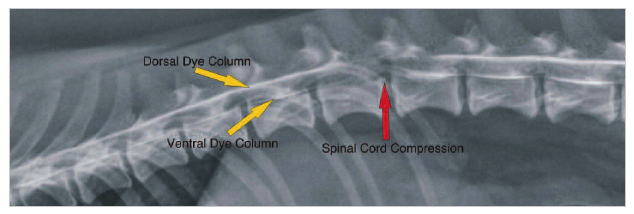| Anatomy of the disk and spinal cord. (Image source) |
Intervertebral Disk Disease is a broad term referring to a
disorder in the spinal column. This condition is most commonly seen in short
leg long backed dogs. (Think dachshund, basset hound, shih tzu, and Pekinese breeds.)
| Good advice for any breed! (Image Source) |
Typical presentation for this condition is acute pain.
Many patients will seem uncomfortable when laying down or have difficulty using
their back legs. They may also have a hard time navigating stairs or refuse to
jump when they normally would. The pain can be anywhere along the spinal column.
It comes from the disk being inflamed and pushing on the spinal cord. Depending
on the degree of inflammation this pressure puts on the spinal cord, it could
lead to temporary or permanent paralysis.
 |
| X-ray with special dye showing compression of spinal cord (Image Source) |
In mild cases radiographs (x-rays), can be used to show
if there are boney changes along the vertebrae. These can typically be managed
with strict cage rest and medications. These medications will include those to
decrease inflammation, pain and possibly muscle relaxation. The most important
aspect of treatment however is CAGE REST. With constant motion, inflammation
will continue and could lead to permanent damage. In more severe cases referral
to a specialty clinic may be necessary. Here they may look at advanced imaging
such as a CT scan or an MRI. This will help them pin point the lesion and
proceed with surgery if necessary.
| Typically surgery will require a very large incision! (Image Source) |
Surgical intervention is used in very advanced cases.
Typically a portion of the vertebrae is removed to relieve some of the pressure
placed on the spinal cord. Surgery is used to alleviate pain but also hopefully
preserve limb function, if we intervene quickly enough. In some cases their
limbs may never function normally again. They may need help moving and this is
where carts may be necessary.
| Many dogs in carts can lead happy lives! (Image Source) |
Getting your pet into the vet at the first sign of illness
may help minimize their risk for more advanced disease. It will also help make
them more comfortable. For more information on this condition please view the following
website here.
No comments:
Post a Comment